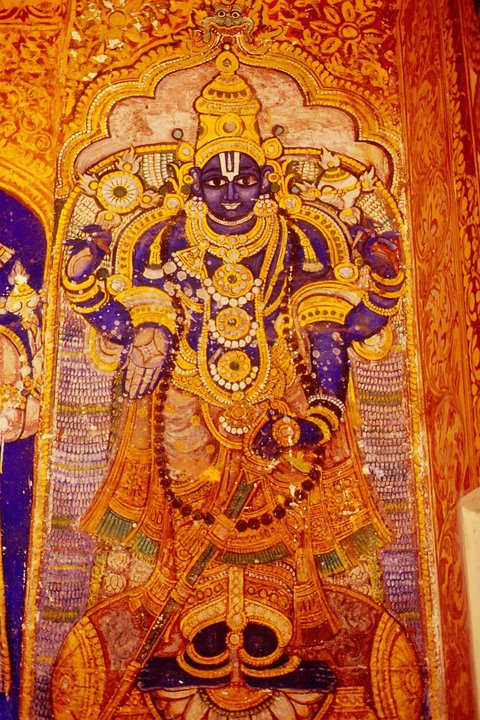Published from “Three Minutes” series written by A.S.Rajagopalan Swami of Ohio.
 icChA mIna vihAra kacChapa mahA
potrin yadR^icChA hare rakShA vAmana roSha rAma karuNAkAkutstha helA halin |
icChA mIna vihAra kacChapa mahA
potrin yadR^icChA hare rakShA vAmana roSha rAma karuNAkAkutstha helA halin |
krIDA vallava kalka vAhana dashA
kalkin iti pratyahaM jalpantaH puruShA punanti
bhuvanaM puNyaugha paNyApaNAH ||
(svAmi deshikan, dashAvatAra storam)
icChA mIna = Self-willed fish
vihAra kacChapa = playful tortoise mahA potrin = gigantic wild boar yadR^icChA hare = Spontaneously, lion rakShA vAmana = protecting vAmana roSha rAma = indignant rAma
karuNA kAkutstha = rAma, of the mercy and kindness filled kAkustha clan
helA halin = plough-wielder
krIDA vallava = executor of impossible tasks
kalka vAhana dashA kalkin = kalki perumAn, who is going to ride on a white horse!
purushAH = people who
iti pratyaham = say or pray like this everyday and
jalpantaH = chant
puNyaugha paNyApanAH = and who are like shops carrying dharmic virtues as sales objects
punanti bhuvanaM – cleanse the world
svAmi vedanta deshikan, most likely, is the most supreme preceptor (AcArya) of the shrI vaiShNava
tradition (sampradAyam). He is the epitome of knowledge (j~nAana), detachment (vairAghya), devotion (bhakti), and adherence to the shrI vaiShNava scripts (shAstra anusanTAnam). He has contributed enormously in multiple languages. This dashAvatAtra stotra is one of the gems, which describes a salutation to each of the ten incarnations (avatAra-s) of the Lord. svAmi deshika composed this while he was worshiping in the dashAvatAra sanctum (sannidhi) in shrIra~Ngam.
In this verse (shloka), svAmi deshikan precisely puts all ten avatAra-s in less than a single verse. For each avatAra, he gives exactly one adjective that best describes that incarnation.
Lord’s incarnations have been enumerated as ten by AzhvAr-s. He appeared as a 1. Fish in his first avatAra, 2. Tortoise to have fun 3. Huge wild boar 4. nR^isimha (man-lion form) when no one (including Himself) expected. 5. vAmana, whose only objective is to protect (rakShA) those who surrender to Him. 6. Angry parasurAma 7. rAma, the ocean of mercy and kindness 8. balarAma with a plough 9. KR^iShNa, a player, playing (lIlA) with everyone as a cow-herd (iDaiyan) and finally, 10. kalki, the rider on a white horse, who has yet to make his appearance. Even those who simply blabber these avatAra names will make the world holy. They are like streets of warehouses filled with good deeds (puNyams).
Now let us see how those adjectives aptly suit each avatAra.
- Lord came down first at His own wish (sha~nkalpam). He is independent and need not obey anyone. Thus, icChA fits nicely to describe the reason for incarnation.
- Lord did everything sportively – churning the milk ocean (pARkaDal), as a bewitching girl (mohini avatAra) etc.
- The wild boar is huge with a single horn. Besides He preached as varAha (boar) the final hymn (carama shloka) to earth goddess (bhUdevi), He lifted the entire universe with a single horn. What other word but ‘great’ (mahA) can describe this?
- The magnificence of nR^ismha avatAra is a sudden explosion. He instantly appeared at a time that no one expected. The term yadR^icCha means spontaneous or without any indication.
- vAmana avatAra is the only avatAra without any killing. He protected friends (Indra and devA-s) and even the enemy (mAhAbali) and changed his mind as well. He stamped the entire universe with His holy feet. Protector means vAmana.
- ParasurAma is analogous to anger. He beheaded his own mother by listening to his father’s words and vowed to wipe out warrior class (kShatriya kulam) entirely. ‘roSha’ here means indignant.
- rAma avatAra is the very personification of kindness. You can see it every instant.
- balarAma always had the plough.It was inseparable from Him.
- KR^iShNa means play. What other word can describe that better?
- Finally, kalki reminds us immediately of a white horse.
One can benefit a lot by studying svAmi deshika’s style and insight, especially in this verse. Try to adopt some when you write an essay, letter or give a speech.
1. Target brevity; Less is more (although this may be difficult)
2. Use appropriate words : Understand the whole and choose the most appropriate. (like multiple choice questions)
3. More on preparation and less on execution. Deshikan was constantly contemplating about the Lord through scripts, AcArya advice, meditation etc. He was filled with knowledge and when the time came, everything poured out so nicely and easily.









